13 Best Herbal Teas For Premenstrual Syndrome
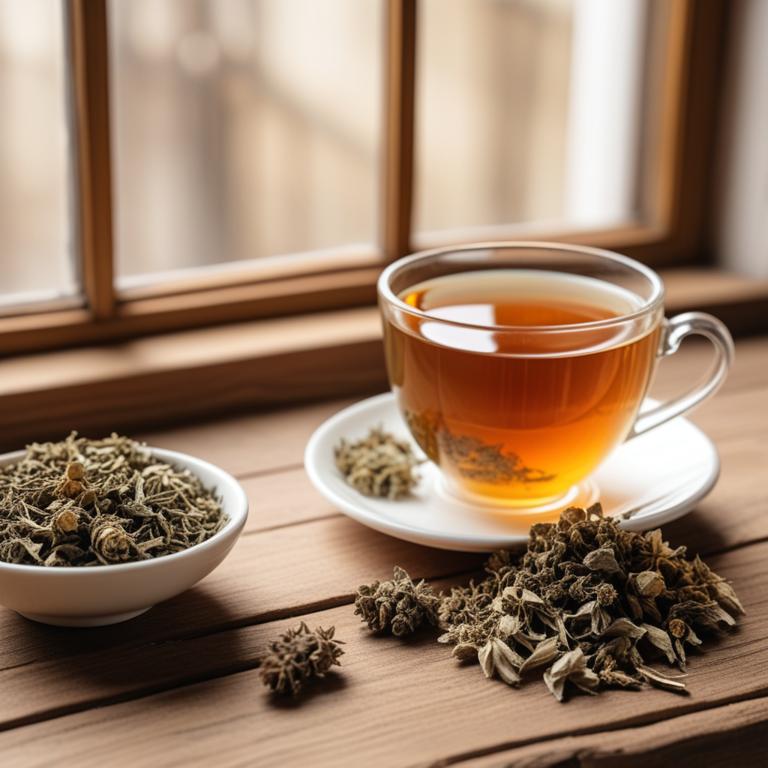
Herbal teas for Premenstrual syndrome are a type of herbal remedy that helps alleviate the symptoms associated with this condition, characterized by physical, emotional, and behavioral changes in women before menstruation.
These teas offer numerous benefits, including reducing symptoms of bloating, mood swings, and breast tenderness, as well as promoting relaxation and reducing stress levels.
Some popular examples of herbal teas used to treat Premenstrual syndrome include Peppermint tea, which helps ease digestive issues and reduce nausea; Ginger tea, which aids in reducing inflammation and alleviating pain; Chamomile tea, which promotes relaxation and calms the mind; Lavender tea, which helps regulate mood and reduce anxiety; Raspberry leaf tea, which supports uterine health and eases menstrual cramps; and Dandelion tea, which helps reduce water retention and bloating.
By incorporating these herbal teas into their daily routine, women can find natural relief from the symptoms of Premenstrual syndrome and improve their overall well-being.
According to "Primary care", teas for premenstrual syndrome may be helpful, and some evidence points to the efficacy of certain teas such as those containing calcium, magnesium, and vitamin E, which are also shown to alleviate symptoms of premenstrual syndrome.
Below there's a list of the 13 best herbal teas for premenstrual syndrome.
- 1. Zingiber officinale teas
- 2. Cinchona officinalis teas
- 3. Vitex agnus-castus teas
- 4. Valeriana officinalis teas
- 5. Ginkgo biloba teas
- 6. Paeonia lactiflora teas
- 7. Lavandula angustifolia teas
- 8. Angelica sinensis teas
- 9. Crataegus monogyna teas
- 10. Melissa officinalis teas
- 11. Silybum marianum teas
- 12. Avena sativa teas
- 13. Cynara scolymus teas
Also you may be interested in...
TODAY'S FREE BOUNDLE
Herb Drying Checklist + Herbal Tea Shopping List + Medicinal Herbs Flashcards
Enter you best email address below to receive this bundle (3 product valued $19.95) for FREE + exclusive access to The Aphotecary Letter.
$19.95 -> $0.00
1. Zingiber officinale teas

Zingiber officinale teas, derived from the root of the ginger plant, have been traditionally used to alleviate symptoms associated with premenstrual syndrome (PMS).
The anti-inflammatory and antioxidant properties of Zingiber officinale teas help to treat this ailment by reducing inflammation and oxidative stress, which are often underlying causes of PMS symptoms.
The bioactive constituents of Zingiber officinale teas, including gingerols and shogaols, have been shown to inhibit the production of prostaglandins, hormone-like substances that can contribute to PMS symptoms such as pain, bloating, and mood swings.
The benefits of using Zingiber officinale teas to treat PMS include reduced symptoms of anxiety and depression, improved digestion, and a decrease in menstrual cramp severity.
Related Study
According to "Disease-a-month : DM", Zingiber officinale teas may help improve premenstrual syndrome, although more study is needed on this herb.
2. Cinchona officinalis teas

Cinchona officinalis teas have been traditionally used to treat premenstrual syndrome (PMS) due to their analgesic and anti-inflammatory properties, which help to alleviate symptoms such as cramps, bloating, and mood swings.
The bioactive constituents of Cinchona officinalis, including quinine and quinovic acid, have been found to possess anti-inflammatory and analgesic properties, which help to reduce pain and inflammation associated with PMS.
By consuming Cinchona officinalis teas, individuals can experience a reduction in symptoms and an improvement in overall well-being, making it a potential natural remedy for PMS.
The benefits of using Cinchona officinalis teas to treat PMS include a non-invasive and non-pharmacological approach to managing symptoms, reducing the risk of side effects associated with conventional medications, and promoting overall health and wellness.
Related Study
According to "Disease-a-month : DM", Cinchona officinalis teas may help improve premenstrual syndrome, although more study is needed on this herb.
3. Vitex agnus-castus teas
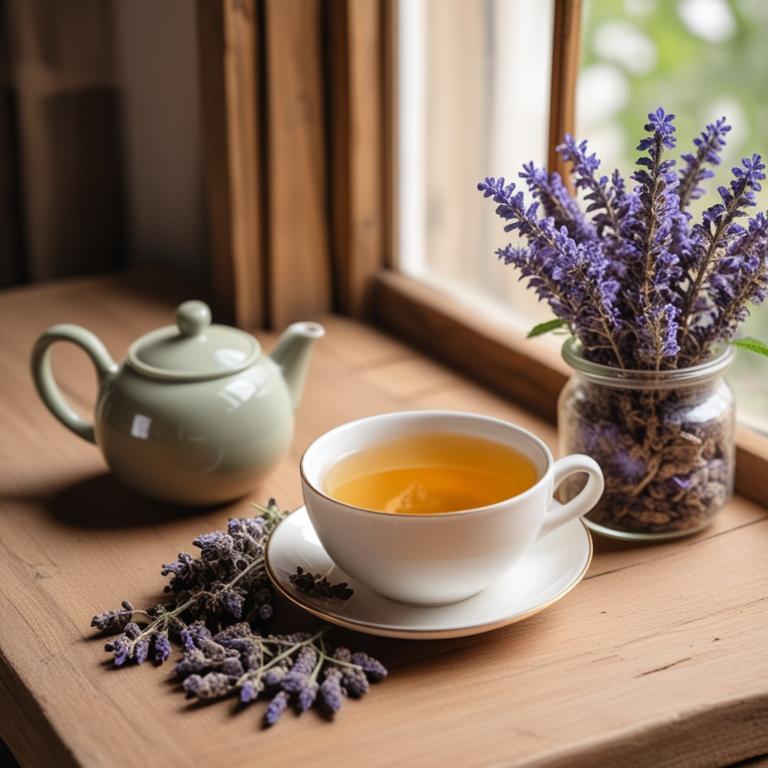
Vitex agnus-castus teas have been traditionally used to treat premenstrual syndrome (PMS) due to their anti-anxiety and antispasmodic properties, which help to alleviate symptoms such as mood swings, breast tenderness, and abdominal cramps.
The bioactive constituents of Vitex agnus-castus, including flavonoids, alkaloids, and iridoid glycosides, play a crucial role in modulating hormone levels and regulating the menstrual cycle, thereby reducing PMS symptoms.
By promoting the release of dopamine and serotonin, Vitex agnus-castus teas help to improve mood and reduce symptoms of anxiety and depression associated with PMS.
The benefits of using Vitex agnus-castus teas to treat PMS include reduced severity of symptoms, improved emotional well-being, and a natural and non-habit forming approach to managing PMS.
Related Study
According to "BMJ (Clinical research ed.)", Vitex agnus-castus teas for premenstrual syndrome have been found to be an effective and well-tolerated treatment, with significant improvement in symptoms such as irritability, mood alteration, and bloating, and a responder rate of 52%.
4. Valeriana officinalis teas

Valeriana officinalis teas have been traditionally used to treat premenstrual syndrome (PMS), a common health issue affecting women before their menstrual periods.
The sedative properties of Valeriana officinalis teas, particularly its ability to reduce anxiety and promote relaxation, help to alleviate symptoms associated with PMS, such as mood swings and irritability.
The bioactive constituents of Valeriana officinalis teas, including valerenic acid, valeranone, and isovaleric acid, are responsible for its anxiolytic and sedative effects, making it an effective herbal remedy for PMS.
By consuming Valeriana officinalis teas, women can experience the benefits of reduced stress and anxiety, improved sleep, and a decrease in PMS-related symptoms.
Related Study
According to "Journal of family medicine and primary care", Valeriana officinalis teas for premenstrual syndrome may be used as a supportive therapy to target both pelvic pain and the neuronal symptoms of dysmenorrhea due to its historical use in menstrual disorders.
5. Ginkgo biloba teas

Ginkgo biloba teas have been traditionally used to alleviate symptoms of premenstrual syndrome (PMS), a common condition affecting women of reproductive age.
The properties of this herbal preparation, including its antioxidant, anti-inflammatory, and adaptogenic properties, help to treat PMS by reducing stress, anxiety, and mood swings.
The bioactive constituents of Ginkgo biloba teas, such as flavonoids (e.g., quercetin, kaempferol), terpenoids (e.g., bilobalide), and bilobalane, contribute to its therapeutic effects by modulating neurotransmitters, improving blood flow, and reducing oxidative stress.
By incorporating Ginkgo biloba teas into their daily routine, women may experience benefits such as reduced severity of PMS symptoms, improved mood, and enhanced overall well-being.
Related Study
According to "Disease-a-month : DM", Ginkgo biloba teas may improve premenstrual syndrome symptoms, but more study is needed to confirm its effectiveness.
6. Paeonia lactiflora teas
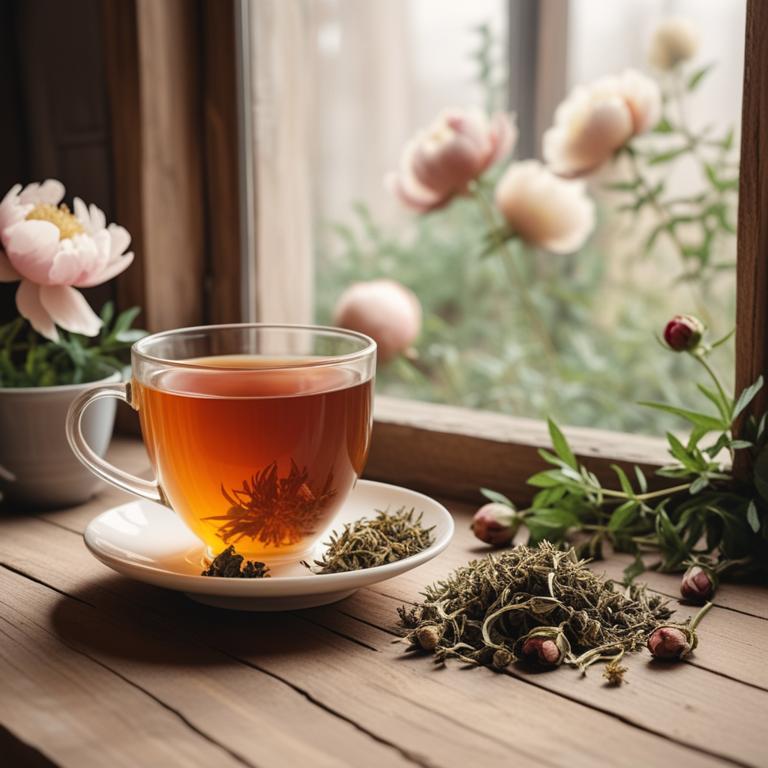
Paeonia lactiflora teas have been traditionally used to treat the premenstrual syndrome (PMS) due to their anti-inflammatory, antispasmodic, and antioxidant properties, which help to alleviate symptoms such as breast tenderness, mood swings, and anxiety.
The bioactive constituents of Paeonia lactiflora teas, including paeonol, paeoniflorin, and paeonol glucoside, contribute to their therapeutic effects by inhibiting prostaglandin synthesis and reducing muscle spasms.
Paeonia lactiflora teas have been shown to help treat PMS by reducing symptoms and improving overall well-being, making them a popular natural remedy for this common condition.
The benefits of Paeonia lactiflora teas in treating PMS include reduced severity of symptoms, improved mood, and enhanced quality of life, making them a valuable addition to a holistic approach to managing PMS.
Related Study
According to "Disease-a-month : DM", Paeonia lactiflora teas may help improve the symptoms of premenstrual syndrome.
7. Lavandula angustifolia teas

Lavandula angustifolia teas, also known as English lavender tea, have been traditionally used to treat premenstrual syndrome (PMS) due to their calming and soothing properties.
The herbal preparation of Lavandula angustifolia tea helps to treat PMS by reducing anxiety and stress, promoting relaxation, and regulating mood swings.
The bioactive constituents of Lavandula angustifolia tea, including linalool and linalyl acetate, have been found to possess anxiolytic and anti-inflammatory properties, which contribute to its therapeutic effects.
The benefits of using Lavandula angustifolia tea to treat PMS include reduced symptoms of anxiety, improved sleep quality, and a decrease in physical discomfort associated with menstrual cramps.
Related Study
According to "Fitoterapia", Lavandula angustifolia teas may be a promising candidate for the treatment of premenstrual syndrome due to its ability to increase progesterone levels and regulate menstrual cycles, as seen in PCOS patients in this study.
8. Angelica sinensis teas
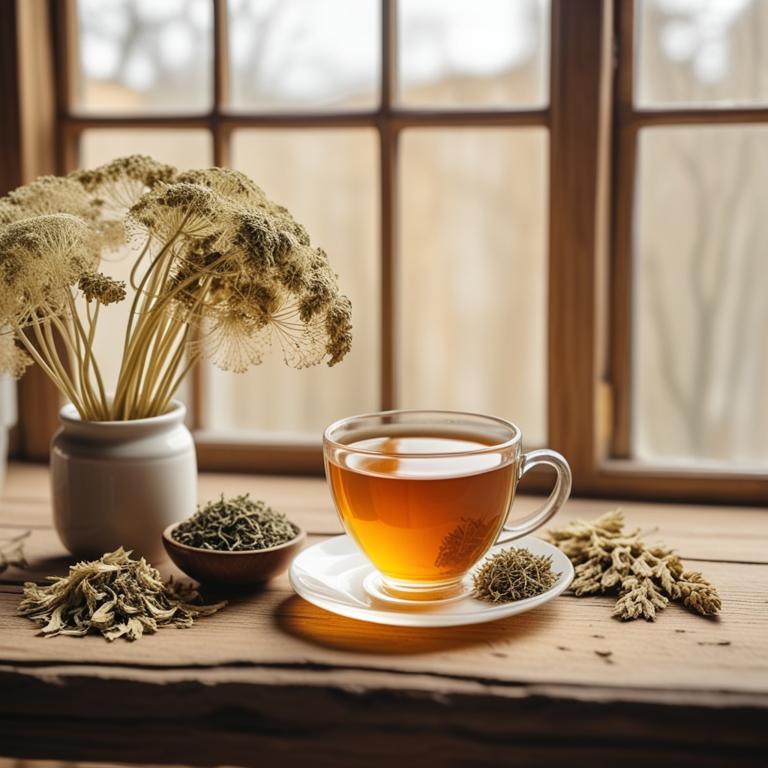
Angelica sinensis teas, also known as dong quai, have been traditionally used to treat premenstrual syndrome (PMS) due to their adaptogenic and anti-inflammatory properties.
The bioactive constituents of this herbal preparation, including ferulic acid, isoflavones, and coumarins, help to alleviate symptoms of PMS by regulating hormonal balance, reducing inflammation, and promoting relaxation.
The benefits of using Angelica sinensis teas to treat PMS include reduced symptoms of bloating, mood swings, and breast tenderness, as well as improved overall well-being and quality of life.
Overall, Angelica sinensis teas offer a natural and effective way to manage PMS symptoms, making them a popular choice among women seeking alternative remedies.
Related Study
According to "Disease-a-month : DM", Angelica sinensis teas may help improve premenstrual syndrome, but more study is needed to confirm this.
9. Crataegus monogyna teas

Crataegus monogyna teas have been traditionally used to treat the premenstrual syndrome (PMS) due to its anti-anxiety and anti-inflammatory properties.
The flavonoids, phenolic acids, and alkaloids present in Crataegus monogyna teas help to alleviate PMS symptoms such as mood swings, bloating, and breast tenderness by reducing oxidative stress and inflammation.
The bioactive constituents of this herbal preparation, including quercetin, kaempferol, and amyrin, also exhibit estrogen-regulating and antioxidant properties, which contribute to its therapeutic effects on PMS.
The benefits of using Crataegus monogyna teas to treat PMS include reduced severity of symptoms, improved mood, and a decrease in the risk of developing related conditions such as depression and anxiety disorders.
Related Study
According to "Disease-a-month : DM", Crataegus monogyna teas may help improve the symptoms of premenstrual syndrome, but more study is needed to confirm its efficacy.
10. Melissa officinalis teas

Melissa officinalis teas, also known as lemon balm, have been traditionally used to treat premenstrual syndrome (PMS) due to its calming and relaxing properties.
The bioactive constituents, including rosmarinic acid, apigenin, and luteolin, help to reduce stress and anxiety, alleviate symptoms of PMS such as mood swings and irritability, and promote a good night's sleep.
By acting as a nervine and anxiolytic, Melissa officinalis teas help to soothe the nervous system, reducing the severity of PMS symptoms and improving overall well-being.
The benefits of using Melissa officinalis teas to treat PMS include reduced menstrual cramps, improved mood, and enhanced quality of life, making it a popular natural remedy for women experiencing PMS symptoms.
Related Study
According to "Disease-a-month : DM", Melissa officinalis teas may help improve the symptoms of premenstrual syndrome, although more study is needed to confirm its efficacy.
11. Silybum marianum teas

Silybum marianum teas, also known as milk thistle tea, have been traditionally used to treat premenstrual syndrome (PMS) symptoms due to their anti-inflammatory and antioxidant properties.
The flavonoids and silymarin present in this herbal preparation help to alleviate symptoms of PMS, including mood swings, bloating, and breast tenderness, by regulating hormonal imbalances and reducing inflammation.
The bioactive constituents of Silybum marianum, including silibinin and silidianin, have been shown to exhibit antioxidant and anti-inflammatory effects, which contribute to its therapeutic benefits in treating PMS.
Drinking Silybum marianum tea may help to reduce the severity of PMS symptoms, improve mood, and promote overall well-being, making it a potential natural remedy for this common women's health issue.
Related Study
According to "Disease-a-month : DM", Silybum marianum teas may help improve premenstrual syndrome, however, more study is needed on this herb.
12. Avena sativa teas

Avena sativa teas, also known as oat straw tea, are a natural herbal remedy that has been used to alleviate symptoms of premenstrual syndrome (PMS).
The anti-anxiety and sedative properties of this herbal preparation help to calm the nervous system and reduce symptoms such as irritability, anxiety, and mood swings associated with PMS.
The bioactive constituents, including avenanthramides and avenacosides, have been found to have anti-inflammatory and antioxidant properties, which may contribute to the tea's ability to reduce PMS symptoms.
Drinking Avena sativa teas regularly has been reported to provide benefits in treating PMS, including improved mood, reduced stress, and enhanced sleep quality.
Related Study
According to "Disease-a-month : DM", Avena sativa teas may help improve the symptoms of premenstrual syndrome.
13. Cynara scolymus teas
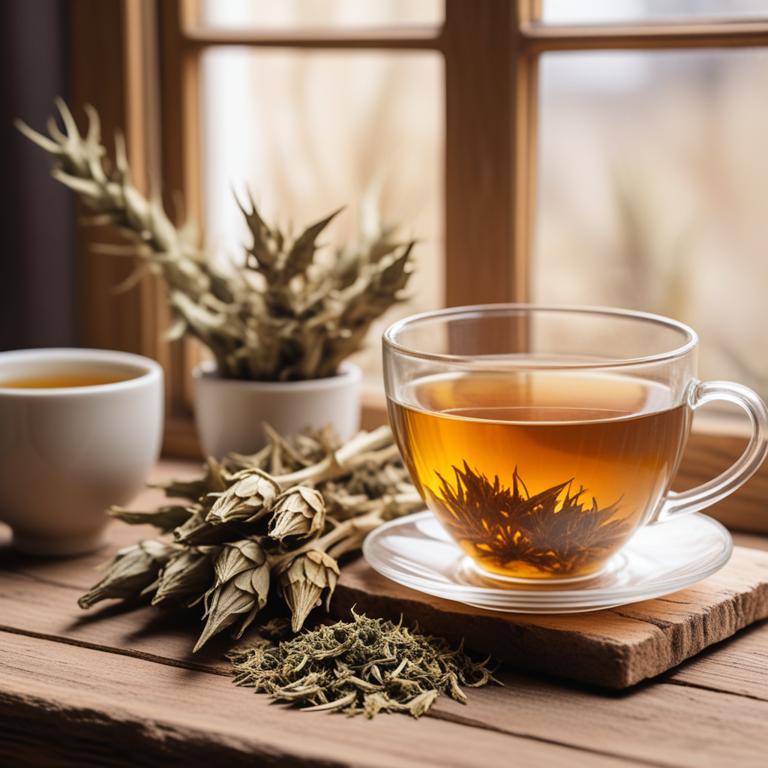
Cynara scolymus teas, also known as artichoke tea, have been traditionally used to treat premenstrual syndrome (PMS) due to its anti-inflammatory and antioxidant properties.
The silymarins present in this herbal preparation help to reduce bloating, water retention, and breast tenderness associated with PMS.
The flavonoids and phenolic acids in Cynara scolymus teas also have a sedative effect, which can help to alleviate mood swings and anxiety that are common symptoms of PMS.
By consuming Cynara scolymus teas, women may experience relief from PMS symptoms, improved mood, and reduced inflammation.
Related Study
According to "Disease-a-month : DM", Cynara scolymus teas may help improve premenstrual syndrome symptoms, but more study is needed.